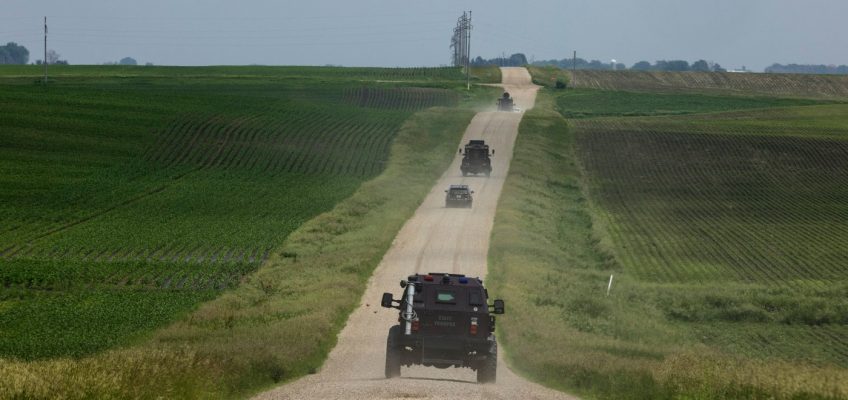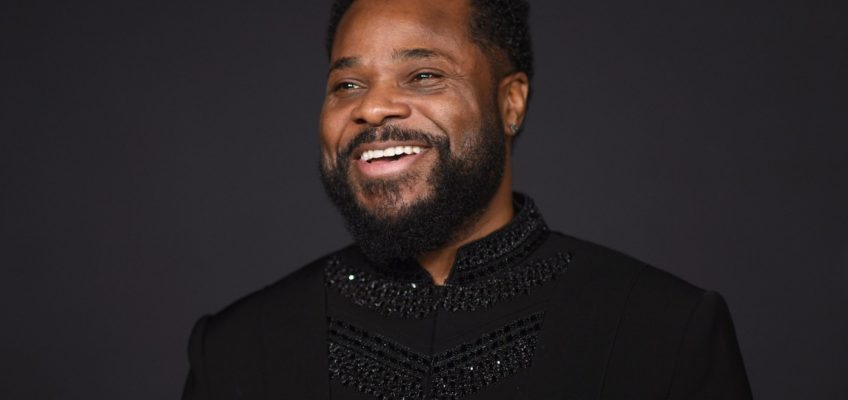The sudden change in the teenager was dramatic and unsettling, as if some internal switch had been thrown. Those who knew him could only wonder: What has come over Vance Boelter?
One moment, he was an affable college freshman, pursuing a family passion by trying out for the baseball team. The next, he was giving up the game and shedding his belongings — even his cherished baseball bat — as if to put away childish things.
This photo made available by the Ramsey County Sheriff’s Office shows Vance Luther Boelter, the man accused of assassinating the top Democrat in the Minnesota House, as he was arrested late Sunday, June 15, 2025. (Ramsey County Sheriff’s Office via AP)
Suddenly, he was telling dorm mates they were going to hell, denouncing a guest speaker on campus as “Satan’s worker” and announcing he was now “all in for Jesus.” It was a lifelong commitment that he would just as suddenly violate 40 years later, prosecutors say, with an act of political assassination that would stun the nation and send his home state of Minnesota into communal mourning.
Throughout his life, Boelter’s Christian belief in the sanctity of life seemed unwavering. He told a church congregation in 2021 that all the world’s wealth was “not worth the value of the person on your left, or the person on your right, or the person you see going home today.”
But his worldview darkened as his fortunes declined. He moved from state to state, job to job. He went from overseeing large food-service operations to collecting bodies for funeral homes, struggling at the same time to pair his spiritual and business interests while his wife homeschooled their five children. He began following a far-right website that trafficked in conspiracy theories about stolen elections and evil Democrats. He became distant.
In the first dark hours of June 14, prosecutors say, the pious Boelter, 57, set out to commit a crime that would break a commandment. He drove off in a black SUV outfitted to resemble a police cruiser with several firearms and the names and addresses of intended targets. Less than two hours later, a Democratic legislator and her husband were dead, and another Democratic lawmaker and his wife had been critically wounded.
How much the spiritual and political beliefs overlap in the Venn diagram of Boelter remains unclear. So far, nothing revealed by prosecutors suggests that the shooter was motivated by religious fervor.
But in correspondence with The New York Times through the jail’s electronic messaging service, Boelter suggested that the bloodshed was partly rooted in the Christian commandment to love one’s neighbor. “Because I love my neighbors prior to June 14th I conducted a 2-year-long undercover investigation,” he wrote.
His cryptic messages to the Times, which also referred to a mysterious military operation, seemed disconnected from reality and in keeping with various handwritten notes of his recovered by law enforcement. They suggest a man in the throes of grandiose delusion, one who saw himself as somehow chosen to save the country by taking extreme action.
“Doing what most people know needs to be done,” he wrote to himself, “but are not willing to do it themselves.”
Intense spiritual shift
Boelter arrived at St. Cloud State University in Minnesota as a gangly teenager in the late summer of 1985, fresh from being named the friendliest and most courteous at his high school in the rural Minnesota town of Sleepy Eye. He was intent on trying out for baseball, and the coach, Denny Lorsung, already knew the Boelter name.
Lorsung remembered the freshman’s father, Don Boelter, Sleepy Eye’s baseball coach, as a good, solid man. He also knew Vance Boelter’s older brother, Tarry, as “an excellent player,” skilled enough to have reached the minor leagues.
The long-retired coach still recalls the young Boelter introducing himself at the start of tryouts decades ago — and then, not long after, having the maturity to say in person that he would no longer be trying out for the team.
As for why Boelter was giving up, Lorsung said, “He really didn’t say.”
But Jeff Petricka, a friend who lived on the same dorm floor, knew the reason: religion. He said Boelter told him that he had met some people off campus and would now be leading an uncluttered life dedicated to Jesus Christ.
“He went from being a good, all-around decent friend to, like, a hypnotic zombie,” said Petricka, who recalled buying a stereo and a baseball bat from Boelter for almost nothing.
Petricka said Boelter alienated dorm mates by saying they were condemned to hell, and disrupted a campus event by calling the guest speaker, a writer from Playboy, a hell-bound tool of Satan. “He was screaming and shaking,” Petricka said. “He was just out of his mind.”
Writing this past week to the Times, Boelter said that it was during these late teenage years that “I was first approached by U.S. military about a program that pertains to my case.” He did not elaborate on the far-fetched claim.
Also around this time, in 1985 or 1986, Boelter met David Emerson, a slight, intense man in his early 30s who was attending an evangelical church in St. Cloud. No one, it seems, had a greater influence on the teen’s spiritual development.
Emerson had been a local eccentric in his Minnesota hometown, Osakis, who lived for a while in a tepee in a public park, tapping maple trees to make syrup. He later fell in with a group of evangelical Christians and traveled to Zimbabwe to do missionary work.
When his visa expired, Emerson returned to Minnesota and settled in St. Cloud, where he began counseling Boelter. “I met a believer who discipled me and taught me much about Jesus,” Boelter later recalled.
Emerson went back to Zimbabwe in the summer of 1987 but kept in touch with Boelter. Later that year, Emerson, his fiancee and more than a dozen other missionaries were murdered by anti-government rebels.
After that, Boelter seemed intent on emulating his mentor. He chastised others for being failed Christians, printed a pamphlet to hand out — he told the Times that its title was “He Touched Me in Sleepy Eye, Minnesota, and I Have Never Been the Same” — and set fire to his belongings.
“Burned it all,” said David Carlson, a friend of Boelter’s since fourth grade.
He also set up a tent in a park in Sleepy Eye, where his proselytizing had residents calling him “the preacher,” Carlson said. “He was a totally different person.”
Christ for the Nations
Boelter doubled down.
He ended his studies at St. Cloud and moved to Dallas to attend Christ for the Nations Institute, an unaccredited school founded two decades earlier by Gordon Lindsay, who had made his name as a traveling Pentecostal preacher emphasizing miraculous healing. The institute prepares most of its students, many of whom are from other countries, for some form of Christian ministry.
In the late 1980s, students such as Boelter followed certain rules: An 11 p.m. curfew. Attendance at chapel every weekday and Wednesday evening. No beards or tennis shoes in class. And if you wanted to check out a basketball at the gym, you first had to recite a Bible verse.
Students at Christ for the Nations debated several charismatic Christian theological ideas that encouraged believers to seize power on God’s behalf, including one theory that some individuals could become immortal.
Matthew D. Taylor, a religion scholar who has studied the independent charismatic movement, said such institutions encourage believers to see themselves as agents of the supernatural, while also blending this sense of God-given power with an entrepreneurial spirit and a distrust of many mainstream Christian denominations.
Some emerged from this culture to become influential spiritual and political leaders, Taylor said. “And then there are all these other people who have absorbed the same messages about becoming these great figures and these world changers, and can never quite get it going.”
Professional path
Boelter never quite got it going.
After graduating from Christ for the Nations in 1990, he returned to Minnesota and, according to Carlson, started a ministry in a town not far from Sleepy Eye. He drove around the state pulling a huge cross on wheels, occasionally stopping along the roadside to preach.
“He always kind of took things way far,” Carlson said.
In his exchange with the Times, Boelter said he was licensed and then ordained as a minister by an organization he declined to name.
He returned to St. Cloud State University, earned a degree in international relations in 1996 and looked for ways to finance his faith-based ambitions. He began by buying distressed properties — a vacated church in Arcadia, Wisconsin, for example — to fix up and sell for a profit.
It was in Wisconsin that Boelter met Jenny Doskocil. They married in 1997 and soon had the first of their five children, Grace, followed by three more girls — Faith, Hope and Joy — and a son named after Boelter’s mentor, David Emerson.
Around 2000, Boelter took a job as a supervisor at the Gerber baby food plant in Fort Smith, Arkansas. He and his wife sold their Wisconsin property and moved 800 miles south.
After four years of working in Arkansas, he moved the family back to Wisconsin to become an operations leader at Johnsonville Sausage. Four years later, he moved the family 400 miles west to become a manager at the Del Monte canning plant in Sleepy Eye. Three years after that, in 2011, he uprooted the family again to oversee a food-to-go plant just outside Minneapolis.
If the rootlessness disturbed his wife, she didn’t let on. On a form filled out for the 20th reunion of her high school graduating class, she indicated that her job in their 15-year marriage was to parent and homeschool their five children.
“We have moved several times since we have been married and I have always felt home is where my husband is,” she wrote. “I am thankful!”
Over the years, Boelter started several businesses and nonprofits that came and went. He managed a 7-Eleven in Minneapolis and a wholesale bakery in St. Paul. He and his wife created a security patrol company — promising to “provide security services right to your doorstep” — that never landed any clients.
The Boelters continued to buy and flip properties. They bought an old church in Iowa, converted it to a rental unit, then arranged to sell it to their tenant, Gabrielah Krull. When a personal matter worsened, the single mother said in an email, the Boelters “let me and my children stay there for almost a year, and let me pay them what I could afford.”
“It is hard to believe that Vance could do something so horrific,” Krull wrote. “Especially after how kind they were to me and my children through one of the most horrifying times of our lives.
“I only know the experiences I had with him and his wife, and they seemed like incredible, upstanding people.”
The Boelters also bought a ramshackle, former assisted-living facility in northern Wisconsin. Cala Neu, a local real estate agent who helped the couple sell the building for a modest profit in 2024, remembered that Jenny Boelter told her they planned to use “100% of the purchase price” to support yet another project — in Congo.
In 2021, Boelter and his wife took a gamble by founding a venture called Red Lion Group, which focused on business and Christian-outreach opportunities in Congo.
Boelter did his best to visit Congo and network with its leaders. He also became associated with an evangelical church in Congo. There, more than once, he delivered lengthy sermons recalling his religious experiences, at times crying or dancing or falling to his knees. One of his messages:
“Living for Jesus isn’t easy.”
Distrust in government
In the late summer of 2023, Boelter began collecting bodies for one funeral home in the Twin Cities area, and then a second — “to pay the bills,” he later said. Working nights at this grim task allowed him to focus on his Congo project and other ventures, but nothing found traction.
He and his wife bought a four-bedroom home on a 12-acre lot in rural Green Isle, about 50 miles southwest of Minneapolis. They found affirmation at the Jordan Family Church, a conservative evangelical congregation that held services in a middle school a half-hour’s drive from the Boelter home. Serving on the church’s prayer team, the Boelters would stand at the front after services to pray with anyone who came forward.
Church elders praised them for buying “African fishing boats,” and singled out Boelter for his missionary work abroad. One church leader described him as having “elder vibes” and asked him to lead the group in prayer.
“I know Vance Boelter,” Ken Krause, the leader, said with admiration in a sermon in 2023, according to an audio recording. “The man’s full of the Holy Spirit.”
But Boelter’s private life was bleaker than what his public persona might have suggested. Because he was on call to collect dead bodies in the Minneapolis area, he began renting space in a run-down house in the city that was occupied by three other men, including his childhood friend, Carlson. And because all the bedrooms were taken, he erected plywood walls in the living room, installed a door and secured the makeshift bedroom with a lock.
In recent months — it is unclear precisely when or why — Boelter started slipping into a different mental state. His mood darkened. “More serious and not as cheerful,” recalled Carlson.
Boelter developed a strong distrust of government, especially Democrats. According to Carlson, he believed that the criminal prosecutions of Donald Trump were politically motivated, and that a victory by the Democratic presidential candidate, Kamala Harris, would lead to civil war. He followed the Infowars website, founded by conspiracy theorist Alex Jones.
In February, Boelter quit his funeral home jobs and returned to Congo, which Carlson thought was unwise. “He came back and he couldn’t get the same thing he had before,” he said. “The jobs didn’t pay enough, and there wasn’t enough work.”
June 14
The planning took weeks. Scouring websites for names and addresses. Searching for disguises. Conducting surveillance. Finally, prosecutors say, Boelter was ready to spill blood. It was as if some internal switch had been thrown, again: a man devoted to his Christian faith and with no known history of violence had suddenly decided to become an assassin.
On the evening of Friday, June 13, he asked not to be disturbed. “I’m just getting some rest before I go out tonight,” Carlson recalled his friend saying.
Hours later, in the early-morning dark, Boelter drove off in his customized SUV to execute a plan of mayhem in the Twin Cities suburbs that prosecutors say unfolded this way:
He went first to the home of Democratic state Sen. John Hoffman. Wearing a flesh-colored mask and black tactical vest, Boelter knocked on the door and shouted, “This is the police,” before shooting and critically wounding Hoffman and his wife, Yvette.
Then he went to the homes of two other Democratic lawmakers. But Boelter’s shouts and doorbell ringing at one house went unanswered — the legislator and her family were away — and his stakeout of the other house was unwittingly interrupted by an actual police officer, so he drove away.
His last stop was the home of Melissa Hortman, a Democratic state representative and former House speaker. Wearing a mask and brown wig and shouting that he was a police officer, Boelter fired rounds of gunfire that flashed like lightning, killing Hortman; her husband, Mark; and their golden retriever, Gilbert.
The gunman escaped from approaching police. In his abandoned SUV, its emergency lights still flashing, he left behind firearms and several notebooks with dozens of names of politicians — “but few cohesively written thoughts,” according to an FBI application for a search warrant.
“There is no manifesto explaining his actions,” the document said. But it added that the notebooks contained “some veiled references” suggesting that Boelter may have acted out of some “twisted and misguided sense of doing good.”
In fact, prosecutors say, while being pursued in the largest search in Minnesota history, Boelter sent a text message to his family saying: “Dad went to war last night.”
Less than 48 hours after the shooting, he was found hiding in a field of tall grass about a mile from his Green Isle home. The sun had just set on Father’s Day.
Now, Boelter is in federal custody at a county jail about 30 miles north of Minneapolis, awaiting trial on various state and federal charges, including murder. His federal public defender, Manny K. Atwal, said in an email that Boelter intended to plead not guilty.
Related Articles
Vance Boelter plans to plead not guilty, his attorney says
Federal grand jury indicts man accused of killing Rep. Melissa Hortman
Two Brooklyn Park city council members running for Melissa Hortman House seat
Gov. Tim Walz calls special election for Melissa Hortman’s House seat
Sheriff Bob Fletcher critiques agency info-sharing after lawmaker shootings
Boelter’s wife could not be reached for comment. But she has issued a statement saying the bloodshed of June 14 was “a betrayal of everything we hold true as tenets of our Christian faith,” while an elder for the church he attended described it as “the opposite of what Jesus taught his followers to do.”
It is unclear if Boelter has undergone a psychological evaluation. When contacted by the Times this past week, he engaged in two days of exchanges. He provided straightforward answers to some questions, declined to speak about the case under advice of his lawyer and responded cagily to questions about his seemingly delusional claims of a two-year investigation that he said “was partly initiated by the death of two people.”
In courtroom comments and in exchanges with the news media, Boelter has never denied, nor confirmed, responsibility for the deadly gunfire of June 14. But he has provided many cryptic, even contradictory, statements, including that the violence had nothing to do with Trump or abortion, but rather something much larger and more mysterious.
In a rambling, largely incoherent letter that Boelter wrote to FBI Director Kash Patel shortly before his arrest, he claimed the shootings were part of a dark political conspiracy involving Minnesota’s governor and the state’s Senate seats.
“No one was aware of what I was investigating, not my wife, family, friends or co-workers,” he told the Times. “That is why many are having a very tough time understanding what is going on.”
Asked whether he thought that God had guided the events of June 14 — the gunfire that left two people dead and two seriously wounded — Boelter answered: “Good question.”




